Taking Iboga with the People of Gabon | Part 2
Our first stop is in Gabon, Africa, where consumption of the iboga root bark is intimately tied to the ancient spiritual discipline known as Bwiti. Read the full series.
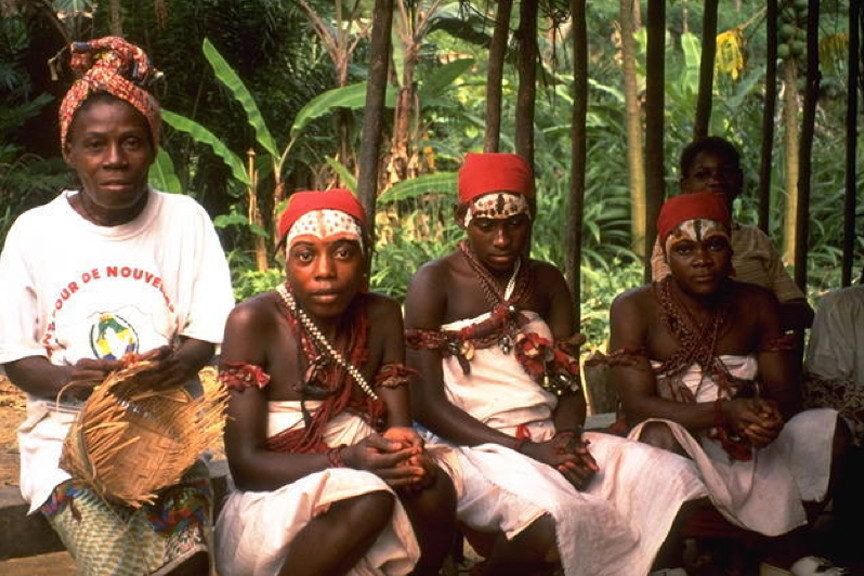
Psymposia is a 501(c)(3) nonprofit research and media organization that offers critical perspectives on drugs, politics, and culture. We rely on contributions from our readers and listeners. Your support is vital to sustaining Psymposia.
Support Psymposia’s independent journalism on Patreon and help us drive the Mystery Machine! We’re a bunch of meddling kids who are unmasking the latest shenanigans on the psychedelics beat.
At the European Ibogaine Forum, we got the chance to learn from German couple Süster Strubelt and Uwe Maas about their experiences in Gabon undergoing initiation into Bwiti, a diverse Gabonese spiritual discipline that uses iboga.
Süster is a clinical psychologist trained in systemic family therapy and hypnotherapy. She wrote her MA thesis on iboga healing in Gabon and was initiated into the Mabandji women’s cult in 2003.
Both Süster and Uwe have an interest in traditional music and trance states.
During our conversation, we learned about some of the differences between ceremonies for men and women, and Uwe and Süster shared some of their observations about Bwiti with us.
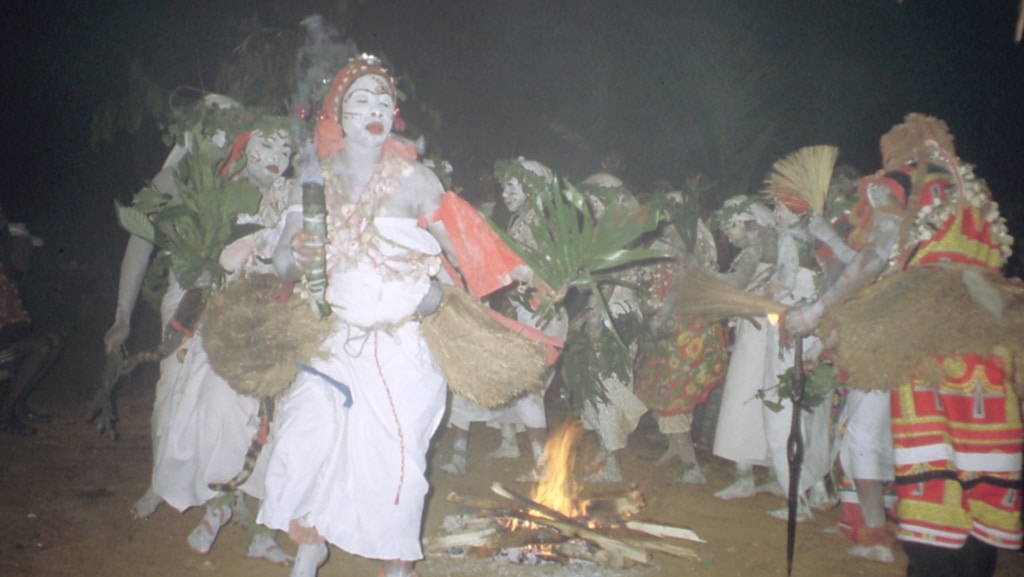
Thanks for taking the time to speak with me. Could you start by bringing us up to speed? How’d you end up in Gabon, and when did you initially hear about iboga?
UWE: I worked in the old Albert Schweitzer hospital, named after a German-French doctor who founded a hospital in the forest in Gabon in 1914. Normally they have two pediatricians in the ward, but one was on leave for a few months and the other was severely sick. So they were desperately looking for someone working in pediatrics who could speak French. I thought this was the chance of my life to do that. This was in 1999.
A few weeks later I was there and I thought, because I was always interested in traditional medicine and traditional music, I want to do music with Gabonese people and I want to learn something about their traditional medicine.
So it took some time until I learned to know my father of initiation, who was called Antoine. He was a traditional practitioner. I watched him doing his work and treating different patients behind his house in the afternoon. So I asked him what he was doing and what it means on a symbolic level.
And he told me, “I will try my best to explain to you, but if you want to understand you have to get initiated.”
I asked him what that means, and he said, “Well, you eat something and you will die and you will be reborn, and nothing will be the same anymore for the rest of your life.”
That was exactly what he told me and that seemed to be a bit shocking because I liked my life as it was, y’know
SÜSTER: And he told you [that] you would hear music differently.
UWE: Yes, he told me that I would see people differently. Exactly what he told me was that I would be able to look inside their head.
Would you say he was right?
UWE: Um, in a way, yes. He told me I would look differently at colors, at nature, at animals, at music. I’m a violinist. I played music together with them and he told me, “Now you’re playing violin just for fun, but afterwards this will be the most serious thing that ever happens.”
SÜSTER: And then you did initiation.
UWE: Yes. I got initiated into the Missoko cult.
So you’re both initiated into different traditions?
UWE: Yes.
SÜSTER: They have different cults in the same village in the Mitsogho tribe. There are different rituals for men and for women.
UWE: Well at first we thought that this is a male and female thing, meaning it depends on sex or gender or however you define it. In the meantime we were told that there are also different purposes of the initiations.
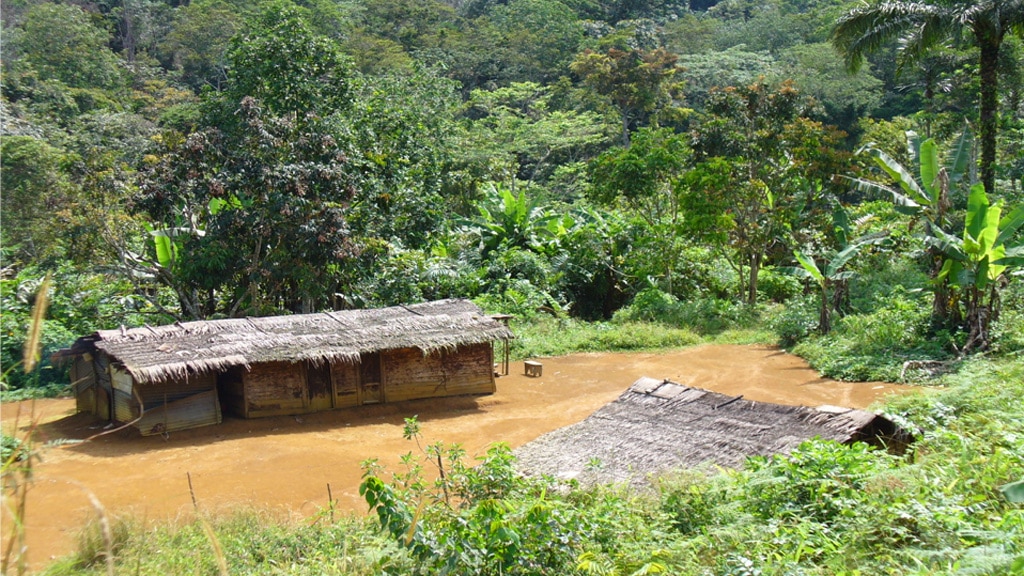
UWE: Well there are differences between groups, or tribes, and there are differences between cults. There are also differences between individual healers and neighboring villages.
SÜSTER: The men’s cult is 2 or 3 days count where you are taking iboga.
UWE: High dose.
We’ve seen a lot of women’s initiations, but we haven’t seen any really 100% traditional male initiations after mine. So we can share much more about the female initiations. Which is interesting because male initiation is obligatory while female initiation should only be performed if there’s a problem. Nowadays there are men who are not initiated, but they still say that every man should get initiated.
Me, I was eating iboga in fresh strips. [They cut it] right in front of me.
Oh, so right off the live plant?
UWE: Yes, exactly. And I was eating a lot of it. I felt nothing. Then an hour later, an old man came with a second root. I didn’t really understand, so I was eating a lot of the next one. And then maybe something like 2 hours after the ceremony started, suddenly the visions started.
I was supposed to tell them everything I saw. I don’t know if this is obligatory.
I was going out of my body and I felt very clear that my ego was something like an energetic ball, like a basketball. I was floating around over water, underwater, through rooms, meeting people – but as that energetic ball, not as a person anymore. And I had some difficulties because I had no hands, feet, speech, whatever. They told me I should open the doors that I saw; I should get into the water that I was floating over.
In the end I found out that I had to imagine it, or I had to wish it, and it was possible. But that took at least an hour until I understood how I could move, how I could talk to people – that I could spiritually talk to people that I was meeting in my visions. But I was still able to communicate with the initiated people around me, in French. That was easy, I was still aware of the situation.
In the physical environment?
UWE: Yes. I would even say I was over-aware because I had the very clear impression that I could read their minds. During the initiation that was very, very clear.
SÜSTER: In the women’s ceremony you are asked afterwards about what you have seen. And they asked me if I had seen an airplane, and I had actually seen an airplane.
And later on I read that the Mitsogho, in the ethnological literature, see airplanes. This is not a very common iboga vision. So there are really certain things that they want you to see. Then they know you are initiated. The proof that you are initiated is that you have seen certain things.
That’s really interesting, that people experience similar imagery.
SÜSTER: They know that you’re seeing personal things they aren’t aware of, but that you’re also seeing [specific] things. You saw certain landscapes.
UWE: Yes. They found it very important that I saw landscapes with high mountains at the edge. There were a lot of things they found very important that I saw. And the interesting thing was that they were guiding me. And if I didn’t have that guidance I’m very sure that I would have been stuck in many situations.
Would you say at any point you felt frightened or overwhelmed? Did you ever just want it to end?
SÜSTER: In the first night, after having taken a small amount of iboga. The first night I had some fear, yes. I had some negative emotions. And then after taking the flood dose, it was really… no it was not frightening.
I had taken ayahuasca before and I found it much more difficult. Really, I found ibogaine much smoother than ayahuasca. Also vomiting, it was not a problem. I just vomited and then I got on with my trip. So I was not frightened.
How many times did you dose throughout the whole experience?
SÜSTER: The women’s initiation starts during the first night with the possession trance. If you can’t perform it, you better not eat iboga. At least they say that they wouldn’t give it [to you]. We’ve never seen this because everyone does a possession trance. It’s easy for them to induce it, even in a European person.
Then you take a small dose in the middle of the night. I told you that was a bit frightening for me at first.
And then the day after, in the evening but before dawn, you take the large dose. And this you take more or less in an hour because they feed it in different ways. They take some leaves, they take some root bark. Part of it is a mixture you can roll in balls and eat.
UWE: There’s wild honey in it and different leaves.
SÜSTER: And then you sit down and you have the visions.
UWE: And you don’t drink with it.
SÜSTER: The first night you usually try not to drink for about 6 hours. You don’t rest for a long time. You are sitting for [a few] hours but then they want you to have another possession trance and they bring you outside, and they ask you questions. You have some time to rest and then in the morning you are running around again.
UWE: But I think this might be specific for the Mitsogho tribe, where we were initiated, because the Fang are giving a much higher dose.
SÜSTER: Yes, and then you really can’t move for a day. The Mitsogho tribe are not giving much iboga.
UWE: I think the time that you can’t walk on your own is limited to maybe something like 6 hours or 8 hours, something like that.
SÜSTER: I think the idea is that they’re not giving much iboga but there’s an additional effect because you are dehydrated and you haven’t eaten the whole day, and you are influenced by the music the whole night. We found that moving and dancing is also followed by more visions.
UWE: It’s very consciously done.
SÜSTER: Yeah. Because with the test doses you have no appetite. You don’t eat anything. And you don’t drink and you’re in a trance-state, and then you have the music and lots of movement.
UWE: I didn’t have any water for at least 24 hours.
Wow. Do you think that’s safe?
SÜSTER: We had heard about the dangers of iboga. When we first came to know about iboga we read a lot. For me it was important because I’m not a person who would [normally] be willing to follow a ritual, but I trusted them.
I think they know what they are doing because they [intentionally] avoid certain risks. For instance, you’re not allowed to go to the river to take a bath. This is a kind of heart protection. Jumping into the cold water might not be very good.
We knew that it’s very dangerous to take other medication with iboga, and we saw that they were really controlling this. They forbade it. They said you are not taking ANY other medication when you are taking iboga. So they really know the risks and they’re very rigid.
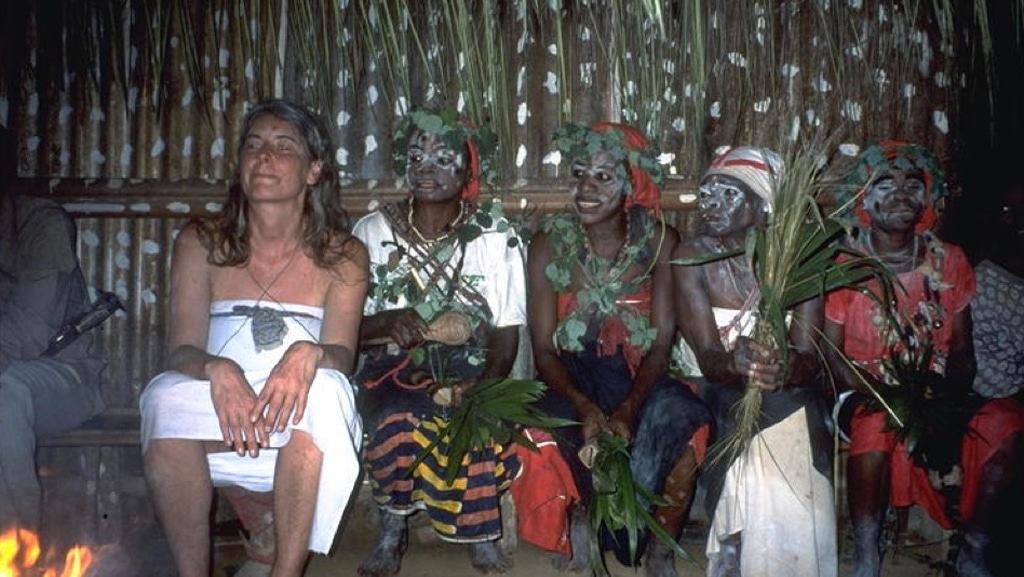
Do the healers take any iboga with the initiates?
SÜSTER: Yes they do. I think they do it because when they want to dance, it’s better, but it also helps you to understand the initiate, and it keeps the healer stay awake the whole night. It’s a very little dose, maybe about 1/100th of the initiate’s.
Do the Mitsogho take iboga regularly, or in any context outside of initiation?
SÜSTER: They don’t take it regularly.
UWE: Well, they take very small amounts in ceremonies.
SÜSTER: As far as I remember, only the people who were dancing took iboga. I think in the women’s ceremony it’s the women who are really dancing, and the men are sitting around and they are not taking iboga.
UWE: Sometimes they are taking it as well.
SÜSTER: Maybe they take it because they just want to, yes. But we have never seen the traditionalists ever taking iboga outside the ceremony.
UWE: We know one man who did it.
SÜSTER: He was criticized a lot.
UWE: Yes, because he took it every day and they said he was addicted.
Well, they told us that it’s possible to take a second flood dose, what they would call second initiation, if there’s a profound change in your life. They were giving me the example of a fatal car accident in your [immediate] family. That would be a reason to do another initiation.
SÜSTER: Or if you want to enter another cult. If you’re a man and you want to enter into the women’s cult because you want to take part in ceremonies or you want to play the instrument there, then you can.
Have you found that the cultural landscape has changed much since you first started going to Gabon?
UWE: Oh, yes.
SÜSTER: Many people who were living in the villages have left. Now it’s mostly older people, some young women who haven’t found work, and children. Many men are working outside [the villages].
UWE: When we arrived in Gabon they were doing at least 1 ritual per month, even in the low season. Nowadays they have no more rituals in that particular village.
I’ve heard a lot of people say that as Gabon has become increasingly more Christian, iboga has been stigmatized and associated with witchcraft. Have you noticed this at all?
SÜSTER: Not really.
UWE: But when? During European colonialism it’s clear that iboga was demonized.
SÜSTER: But it’s not the government persecuting, nowadays. If you don’t want to go to a church and if you want to join an iboga cult, it’s open. You can see them from the road. They don’t hide before the government. But the churches, they are always making politics against traditional healing.
UWE: I would say it’s the opposite. Wherever you go in Gabon, even in a church, if you tell them you’re initiated then you’re really seen as someone.
SÜSTER: I think there might be individual people who are really being influenced by the church, and they’re not going to iboga ceremonies anymore. Personally we know some women who don’t like to go to iboga ceremonies because it costs them a lot of money, so they often choose to go to the Catholic church.
Have you noticed any impact on the supply or availability of iboga?
SÜSTER: No, absolutely not. The healers we know are growing iboga behind their house. They have their own trees. Sometimes they go into the bush and bring back some root. Iboga supply is no problem. It’s not really calculated in the price of an initiation ceremony because it’s just something you get out of the bush.
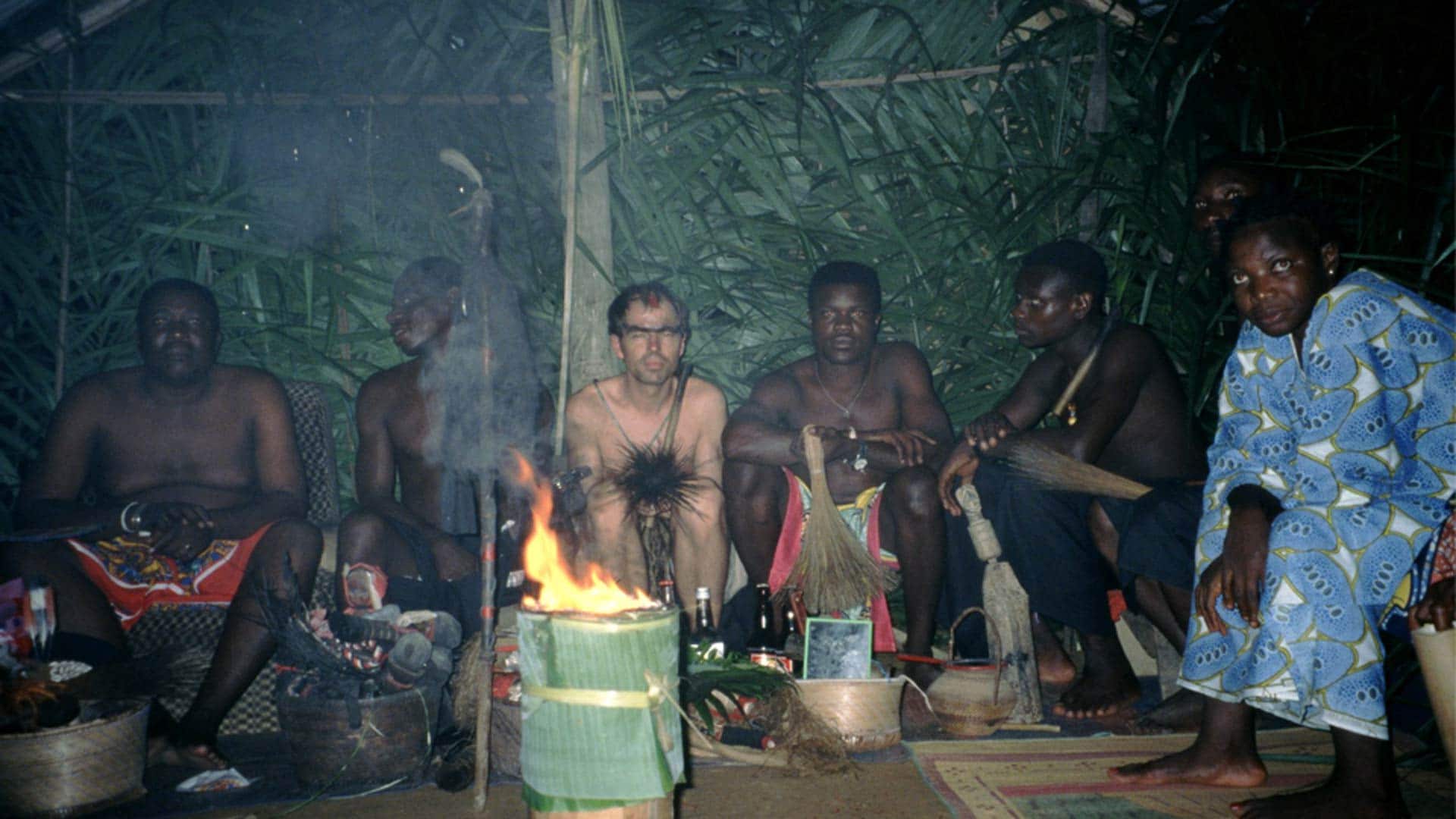
To wrap up, how has iboga had an impact on your own life?
SÜSTER: For me it’s very special because I had no [previous] experience with psychedelics. I had no experience with spiritual literature at all. I was more of a materialistic thinking person. I wasn’t going to church. This changed dramatically afterwards. I went to church for a while, although I don’t anymore. I’m believing in a life after death, and I’d consider myself a spiritual person, which was not the case before.
And there are other changes. I’m hearing music very differently. I’m generally enjoying music more. It’s so very important for me. So for me it was a very phenomenal change.
But I also had some problems. I lost my job. I thought it was because I had changed on some level I didn’t really recognize, but others saw it. My relationship is better, well it’s continued. We have a very strong relationship.
UWE: Everything they told me before turned out to be right. Being an active musician for most of my life, I couldn’t imagine that the way I see music could profoundly change, but it did. Sound, as opposed to melodies, mean so much more to me now. I developed a strong emotional relationship to certain colors, such as a bright blue or a warm orange. My relationship with nature, namely specific plants, animals and rocks, became much more profound.
In relation to people, I completely lost the fear that they could misunderstand me. It’s difficult to explain. It’s my deep belief that they themselves can read my mind. The other way round, I care much less about what they may think about me. And there is a belief in the spiritual world that I already had before, but turned out to be much stronger afterwards.
Interestingly, quite similar changes have been noticed in many people who’ve had what I would call a “natural” near-death-experience, following a heart attack or difficulties during surgery. There must be somatic processes in these situations that have the capacity to connect us not only to the beyond, but also to essential aspects of the world we’re living in. I personally think that maybe the most important therapeutic value of iboga is to bring us nearer to that feeling of “unity” which is often provoked by near-death-experiences, and which is the aim of so many spiritual practices.
This is exactly what I experienced. I got more close to it all.
Read Part 3: How has Western influence changed the traditional use of iboga in Gabon? We talked to a French guy living there.
Hey! Before you go… Psymposia is a 501(c)(3) non-profit media organization that offers critical perspectives on drugs, politics, and culture. We strive to ask challenging questions, and we’re committed to independent reporting, critical analysis, and holding those who wield power accountable.
Our perspectives are informed by critical analysis of the systemic crises of capitalism that have directly contributed to the unmitigated growth of addiction, depression, suicide, and the unraveling of our social relations. The same economic elite and powerful corporate interests who have profited from causing these problems are now proposing “solutions”—solutions which both line their pockets and mask the necessity of structural change.
In order for us to keep unpacking these issues and informing our audience, we need your continuing support. You can sustain Psymposia by becoming a supporter for as little as $2 a month.
Jordan May
Jordan May is a writer who explores the intersections between drug policy, psychedelics, and community engagement.





